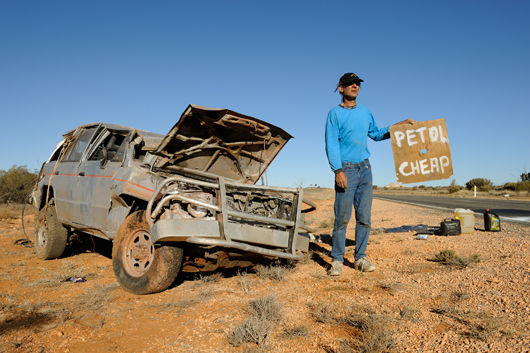A.bc
In Australia, sulle tracce di Chatwin 20 anni dopo Le Vie dei Canti
Palazzo delle Esposizioni, Roma
A.bc
In Australia, in Chatwin's footsteps 20 years after The Songlines Palazzo
Delle Esposizioni, Rome

Scorgendolo
in lontananza lo si può scambiare per uno dei tanti ruderi di macchine
lungo la strada. Nel deserto australiano sembra quasi un costume locale
abbandonare le auto nel nulla. A volte al margine della strada, altre
a due-trecento metri immerse nel bush, magari capovolte, attorniate da
pezzi sparsi, gomme, marmitte, paraurti, volanti. I proprietari, si racconta,
ne spingono l’uso fino all’esalazione dell’ultimo respiro
e poi le spogliano delle parti utili. In questo universo vuoto l’abbandono
è ancora più manifesto. Poi ti avvicini e vedi una sagoma
accanto alla macchina, in piedi con un cartello. Vai veloce, la affianchi
e superi, con la coda dell’occhio cerchi di decifrare il cartello.
Poi freni e decidi di tornare indietro. Nel deserto come in mare aperto
la prima regola è capire se chi incroci ha bisogno di una mano.
Sebastian, 51 anni, genitori arrivati dal Nord d’Italia, lavori
saltuari di qua e di là. Ieri, poco prima di mezzanotte, è
finito sulla terra battuta ai lati della highway e, sterzando per tornare
sull’asfalto, si è capovolto sei volte distruggendo il suo
fuoristrada. Ha perso anche il suo cane, lo ha visto inoltrarsi nel bush
e lo sta ancora aspettando. Ora sta cercando di vendere la benzina rimasta
nel serbatoio, 90 litri calcola. PETOL CHEAP, recita il cartello dove
è saltata una R nella prima parola. 50 cents di meno al litro.
Conta di finire la sua vendita d’occasione da qui al tramonto. Mancano
ancora quattro ore. Poi farà autostop fino al prossimo motel. Il
sole picchia, sembra stremato. Vuoi un po’ d’acqua? «No,
grazie, ho il mio di alcol». Posso fare qualcosa? «No, è
ok». Va bene se faccio una foto? «Certo. Sarò su un
giornale da qualche parte?». Forse sì, in Italia. «Wow».
Alla fine, accetta l’acqua. Continua a salutare agitando il cartello,
nel retrovisore dove si fa sempre più piccolo fino a sparire
Seen
in the distance it can be mistaken for one of the many pieces of wreckage
along the road. In the Australian desert it seems to be a local habit
to abandon old cars in the middle of nowhere. Sometimes on the edge of
the road, others two-three hundred metres inside the bush, perhaps upturned,
surrounded by spare pieces: tyres, silencers, bumpers, wheels. It is said
that the owners use the vehicles till their last gasp and then they take
all the useful parts. In this empty universe the abandonment looks even
more evident. Then you move closer and you see a shape standing beside
the car, with a placard. Driving fast you come up beside it, overtake
it, with a sidelong glance try to decipher what’s on the placard.
Then you stop and decide to turn back. In the desert, just like in the
open sea, the rule is to check whether the person you meet needs a helping
hand. Sebastian, 51, parents from the north of Italy, odd jobs here and
there. Yesterday, just before midnight, he ended up on the dirt along
the highway. Swerving in the attempt to go back on the asphalt, he overturned
six times destroying his off-road. He also lost his dog, he saw it desappear
in the bush and is still waiting for it. Now he is trying to sell the
petrol left in the tank, 90 litres he reckons. PETOL CHEAP says the placard
where an R is missing. 50 cents off per litre. He hopes he’ll make
his bargain sale by sunset. There are still four hours to go. Then he
is going to hitchhike to the nearest motel. The sun is very hot, he looks
exhausted. Do you want some water? «No thanks, I’ve got my
alcohol». Can I do anything for you? «No, it’s ok».
Is it ok if I take a picture? «Sure. I’ll be in a newspaper
somewhere?» Maybe, in Italy. «Wow». In the end, he takes
some water. He keeps waving goodbye with his placard, in the rear-view
mirror where he gets smaller and smaller until he disappears
